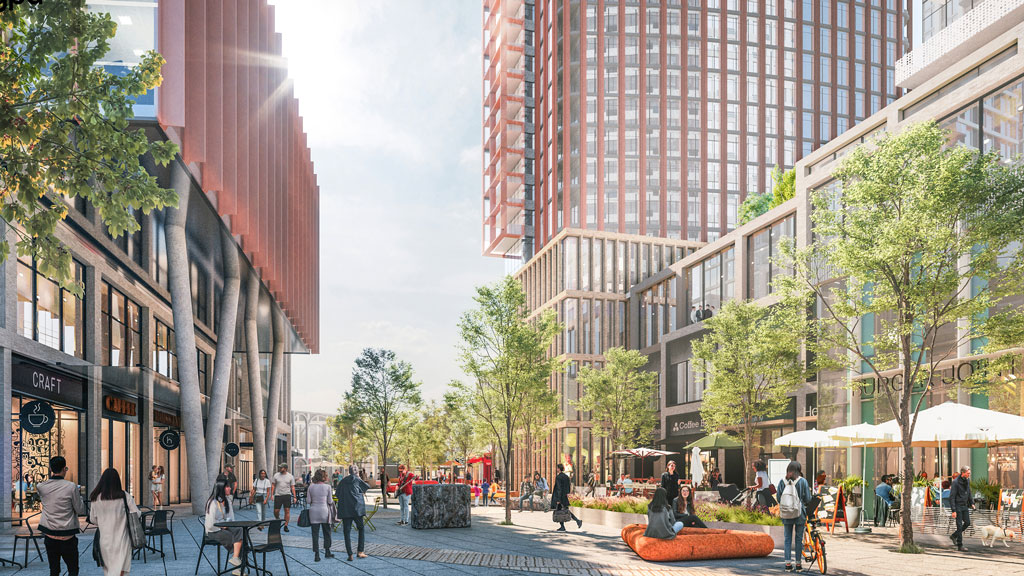Ariel Feldman of Choice Properties had a blunt message for his fellow Toronto developers attending the recent ULI Toronto ESG Symposium: there is no longer any grace period to plan sustainable projects to meet carbon-reduction goals in some distant future; rather, “We need to take action today.”
It takes eight years to plan, finance, obtain permits and build a major structure, Feldman said, and 2022 is almost upon us, so to reach a 50-per-cent reduction in emissions by 2030, the projects developers are working on right now need to be sustainable.
“The International Energy Agency has put out a net-zero roadmap,” said Feldman. “What they’re saying is that in developed countries, we need to be building net-zero-ready buildings by 2025. That’s three years.
“I don’t think we realize the urgency of that mission…we’re 10 years behind where we need to be.”
Feldman and executives with four other Toronto development firms were asked to explain how they are fostering environmental, social and governance (ESG) goals as part of a panel discussion with the theme Industry Leadership – Our Moment to Lead.
The Urban Land Institute event further emphasized the urgency of reaching 2030 and 2050 carbon-reduction as well as other social goals by billing the symposium as The New Urgency.
“ESG is about risk and opportunity,” said Feldman, director of sustainability programs with Choice. “So the risks as I see them are, if we don’t build these net-zero buildings in the next three to 10 years, we’re just going to be retrofitting them by 2050 anyway. I don’t think that’s built into our pro forma right now.”
That’s a financial risk for developers, he asserted, and it also leads to a reputation risk. If developers continue to build buildings as they have the past 10 years, with leakage and poor insulation, he said, but claim they were following tier one of the Toronto Green Standard, customers won’t buy that excuse in 2030.
“We as developers must assemble teams of experts. We need every expert to help us to figure out the path to net-zero. And we need to figure it out now,” Feldman said.
Tsering Yangki, head of real estate finance and development with Dream, noted there has been a confluence of events recently that has caused the real estate sector to refocus on the issues of health, social justice and climate change. The recent UN report warning of a red alert on climate change is further galvanizing the sector, she said.
“This was also a moment in time when I think all of us realized how interdependent and interconnected we are, and how recovering from this period we must ensure that the most vulnerable are not left behind,” said Yangki.
Danielle Feidler, senior vice-president, brand experience with Tridel, called the heightened awareness of ESG a “purpose revolution.” The need for developers to address ESG is no longer just a moral imperative, she said, it’s survival.
“The most successful brands we’re seeing are the ones that are in the social purpose space,” Feidler said. “And they’re not just performing a little bit better. They are performing at a magnitude of what the S&P (Standard and Poor) says is…greater than double digits.”
Generation Z and the millennials are major proponents forcing the shift, Feidler said. Sixty-four per cent of millennials won’t take a job if they can’t see a social purpose to it.
“Competing for talent, I think we see the millennials and Gen Z really making us up our game,” she said.
Andrew Duncan, chief investment officer of RioCan Reit, recalled that investors began to ask about ESG commitments around 2016 and RioCan realized it not only had to develop principles but also show evidence that commitments were being met.
RioCan has adopted the Global Real Estate Sustainability Benchmark to provide the measurements required.
“Over time, ESG has become part of our DNA,” he said. “It’s taken time and commitment and taken hiring specific people in the organization to focus on it, understanding that it is a priority for us.”
Once every developer starts to take measurement seriously, Duncan added, and they are recording a net positive impact on ESG, “then you get universality.”
Andrew Garrett, senior principal, real estate with the Investment Management Corporation of Ontario (IMCO), addressed governance. He said he was seeing progress on the board composition issue, noting with newly created organizations, 39 per cent of board positions have been filled by women. That race spurs a competition between firms, he noted, in addition to broadening the conversations boards are now having.
ESG is now an imperative among major project funders, with Garrett and his peers who write cheques out of pools of capital of $10 billion or more insisting on ESG being embedded in project documents right from the beginning.
“I think governance really has its foot on the pedal,” he said.
Follow the author on Twitter @DonWall_DCN.





Recent Comments
comments for this post are closed